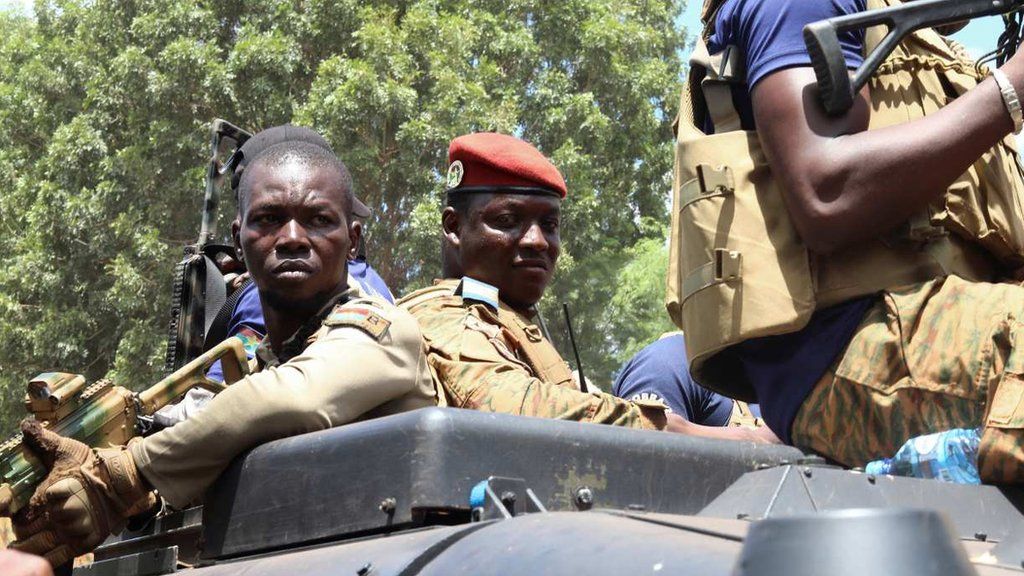Concern over the rash of coups in the neighbourhood
Like a forest fire in this era of climate change, military coups are habitually conflagrating in West Africa. From the Republic of Guinea to the Republic of Mali, Burkina Faso, Niger Republic, and through to Chad Republic, there is a disconcerting contiguity of space now ruled by the top brass of the military in those […]

Like a forest fire in this era of climate change, military coups are habitually conflagrating in West Africa. From the Republic of Guinea to the Republic of Mali, Burkina Faso, Niger Republic, and through to Chad Republic, there is a disconcerting contiguity of space now ruled by the top brass of the military in those countries.
It is getting to be like old times, in the 1960s and 70s, when the military prevailed over most of our neighbourhood. In those troubled years, among the West African countries, probably only Senegal and Cote d’Ivoire missed out on tasting military rule. Then a meeting of ECOWAS heads of state used to be a gathering of General So-so, Col. So-so, and Majors So and So.
Soon it became a free-for-all all among the military that even those within the rank of captains organised successful putsches a la Captains Thomas Sankara and Blaise Compaore in Burkina Faso in 1983. Things degenerated to the very lowest when even a Master Sergeant Samuel Doe overthrew and killed President William Tolbert of Liberia in 1980. Master Sergeant Doe thus had the dubious reputation of having snuffed out the life of the oldest democracy in Africa. Liberia has been an independent democracy since the mid-19th Century and was a foundation member of the United Nations in 1945 at a time when there was hardly any independent country in West Africa.
We are fast returning to those bad old days again. Then it was allegations of corruption among the new democratic rulers and the sit-tight syndrome of the leaders that gave the military excuse to overthrow them. Now it is a different ball game altogether. The new grouse is insecurity.
- Expert to FG: Reverse retirement age to solve unemployment
- Expert laments personnel, facilities’ shortage for VVF treatment
Since the upheaval in Libya in the aftermath of the overthrow of Col Muammar Gaddafi, the resulting instability overflowed to the neighbouring Chad Republic and to many other West African countries which fueled the growth of Boko Haram in Nigeria. The arrival of ISWAP in the region, further complicated matters making many West African countries spend their little resources fighting terrorists of all hues.
The failure to deal with the spread of terrorism has become an excuse nowadays for the military to stage coups. It started in Guinea, then spread to Mali, Chad and Burkina Faso. The latest victim is the Niger Republic, where President Mohammed Bazoum was ousted by his bodyguards. I have always had very high regard for Bazoum. He comes across as a very likeable person imbued with the right dose of patriotism to do the best for his country. I’ve written about him on this page, a few weeks ago when on a visit to Lagos, for the commissioning of the Dangote Refinery, Bazoum broke conventions to speak in the Hausa Language. I wrote:
“Normally heads of state are obliged to speak in the official language of their country, particularly when addressing an international audience. French is the official language of the Niger Republic, but when President Bazoum rose to speak that day, he began in halting English making apologies that he was going to speak in Hausa. And to the surprise of the distinguished gathering he went along to render a beautiful speech in Hausa. The speech which lasted less than three minutes poured encomiums on the patriotic credentials of Aliko Dangote and prayed that the project would be for the good of not only Nigeria but for the African continent as well.
I wasn’t surprised at the medium he chose to communicate because I have encountered President Bazoum several times giving interviews to foreign radio stations in Hausa. The interesting part is that Bazoum is not Hausa. He is of the minority Arab stock, born in the Kanuri-dominated Diffa Region that lies contiguous to northern Borno. Since independence in 1960, all Nigerien presidents have either been Zabarma (Hamani Diori, Seyni Kountche, Ali Seybou, Salou Djibo), Hausa (Mahamane Ousmane, Ibrahim Bare Mainassara, Daouda Malam Wanke, Mahamadou Issoufou), or Kanuri (Mamadou Tinja).
Bazoum is the first Arab to become president of Niger Republic. But he recognises that Hausa is the medium of communication throughout the Republic, and he seizes every opportunity to project it. This is even though he is well-educated in the French language and speaks it like a native.
President Bazoum stands out in these respects and I wish every African country makes it mandatory for its president on every official occasion to speak in his language or the language widely spoken in his country.”
As I write today, ECOWAS is meeting in that magnificent edifice in Asokoro, Abuja, a short distance away from where I live, to consider how to confront the recent scourge in the neighbourhood. I’ve learnt that all the usual items to deal with the situation are on the table: sanctions, closure of borders and withdrawal of assistance. Honestly, all these have never deterred those soldiers determined to engage in a coup. But President Bola Tinubu, the Chairman of ECOWAS and host of the meeting had one or two cards up his sleeve. Already, words are out that ECOWAS has issued an ultimatum of a week to return President Bazoum to power or face dire consequences. I guess that President Tinubu will not shy away from any further decisive measures to return democracy to Niger Republic with Bazoum on the saddle.
